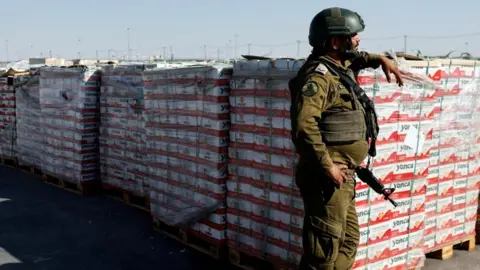The ongoing humanitarian crisis in Gaza has intensified, with recent air drops of aid being described as a “grotesque distraction” by leaders of various aid agencies. Senior representatives from more than 100 international organizations have emphasized that such airdrops will not resolve the deteriorating starvation crisis affecting the territory. As Israel’s military announced efforts to airdrop humanitarian supplies, experts stressed that this tactic cannot sufficiently mitigate the stark challenges facing the Palestinian population.
A recent air drop conducted by Israeli forces was followed by plans for additional such initiatives, with upcoming missions anticipated from the United Arab Emirates (UAE) and Jordan. UK Prime Minister Keir Starmer expressed support for these efforts, stating that the British government would do everything possible to assist in delivering aid to Gaza through aerial means. However, aid workers, including Ciarán Donnelly from the International Rescue Committee, voiced concerns about the inefficacy of air drops in delivering the needed volume and quality of aid.
Notably, the UN’s World Food Programme has issued warnings that approximately one-third of the population in Gaza has not eaten for several days, shedding light on the depth of the crisis as the Hamas-run health ministry reported increasing malnutrition-related deaths. This situation is exacerbated by systematic challenges in delivering traditional ground-based aid, leading to discussions around airdrop strategies that many view skeptically.
Philippe Lazzarini, head of the UN’s Palestinian refugee agency UNRWA, characterized aerial deliveries as inefficient and costly, emphasizing the potential for catastrophic outcomes if the drops fail, which could indeed lead to injuries or even fatalities among vulnerable recipients. He pointed out that thousands of trucks laden with aid are ready and waiting at the borders of Jordan and Egypt, illustrating the logistical capabilities that could be harnessed for more effective aid distribution if political barriers are lifted.
Political will is deemed crucial to facilitate secure and dignified access for those in need. Lazzarini argued for the significance of land routes over aerial deliveries, as the latter presents seeds of chaos, risk, and potential violence over the aid. This is a particularly pressing issue given the contentious context under which aid is provided, where aerial shipments may land indiscriminately, leading to tragic outcomes among recipients in overcrowded areas.
Furthermore, amid these challenges, Israel maintains that there are no restrictions on aid reaching Gaza. However, disputes have arisen regarding operational inefficiencies and bureaucratic hurdles cited by the United Nations, which argue that these obstruct the humanitarian response. Reports have stated that recent efforts by various governments to send aid by air have been inadequate, with a staggering amount of aerial logistics needed to deliver even minimal food support to the millions living in Gaza.
Despite previous attempts to provide assistance through air drops, like those conducted last year by the British Royal Air Force, experts agree that these efforts pale in comparison to the overwhelming needs of the population. For every Gazan resident, rescue efforts suggest a necessity for over 160 flights—an unrealistic expectation against the backdrop of escalating humanitarian crises.
As the conflict continues since the violence reignited in early October 2023, which resulted in significant casualties on both sides, the humanitarian situation has further deteriorated. More than 59,000 individuals have reportedly lost their lives, exacerbated by a blockade that has hindered the flow of essential goods, food, and medical supplies into the already struggling region. Families are now displaced, and reports reveal harrowing conditions in which access to basic necessities has all but vanished.
Conditions in Gaza continue to devolve as dehydration accompanies starvation among the civilian population, fueling despair and urgency among those advocating for more substantial and safer humanitarian strategies to fend off the impending tragedy of mass starvation. As the situation unfolds, it remains critical that humanitarian channels and solutions are prioritized to avert further loss of life in Gaza.












